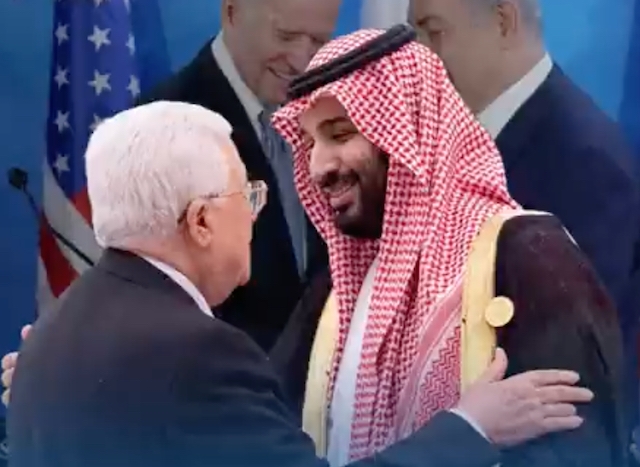As the Saudi-Israeli normalization process continues to seize global attention as one of the most significant peace initiatives of the 21st century, there's a parallel narrative that's equally compelling but conspicuously less reported. Recent revelations suggest that Saudi Arabia may have specific conditions attached to Palestinian concessions.
The Wall Street Journal recently published a detailed article discussing the terms that the Saudi Kingdom might present to the Palestinian Authority (PA) as prerequisites for their consent to normalization with Israel. Interestingly, a pivotal aspect of these terms—a demand by Crown Prince Mohammed Bin Salman (MBS) —has largely been glossed over by the media. Bin Salman insists that the Palestinian Authority must exercise control over territories allocated to it by the Oslo Accords, a stipulation that holds more complexity than initially meets the eye.
ההצעה לאבו מאזן והדיווח בארה"ב: "צעד משמעותי להסכם של סעודיה עם ישראל"https://t.co/HdhNzKMZs0@KerenB_News
— החדשות - N12 (@N12News) August 29, 2023
צילום: AP pic.twitter.com/3foaZxoMCT
According to sources within the Palestinian sphere, a meeting between Abu Mazen (Mahmoud Abbas) and Mohammed Bin Salman back in April laid the groundwork for renewed Saudi financial assistance to the Palestinian Authority. During these discussions, the Saudi Crown Prince told Abbas that the Kingdom is willing to extend considerable support, as long as the PA maintains effective security throughout its territories. This request might seem innocuous at first glance; however, the convoluted governance landscape of the PA suggests otherwise.
This is how you do diplomacy: Saudi Arabia making friends with Israel’s enemy Palestine in order to win Palestinian support for a possible Saudi deal with Israel. Saudi used to back Palestine but they fell out. Doubt South Africa capable of this nuanced statecraft. In @WSJ
— Tom Robbins (@BaragwanathBiz) August 30, 2023
For years, the PA has grappled with internal challenges that have led to relinquishing control over vital areas. Cities like Jenin and Nablus offer stark evidence; they have long been neglected by the Palestinian security apparatus, leading to voids filled by local extremist elements. Furthermore, the situation in Gaza, which remains a stronghold for Hamas, further exacerbates the PA’s governance challenges, providing an almost glaring antithesis to Bin Salman’s condition.
The governance gap in key areas has drawn condemnation from both sides of the West Bank divide. Israeli Defense Force (IDF) officials, particularly in the aftermath of their "Bayit VeGan" operation, argue that the PA’s failure to mitigate extremist activities necessitates additional Israeli interventions. Concurrently, the inhabitants of cities like Jenin have expressed frustration over the lack of resource distribution, despite the PA's assertion that it has raised over $180 million for aid. A public statement from a Jenin residents committee reveals the extent of the dilemma: “None of the donations collected reached the people of the camp.”
WSJ reporting that Saudi Arabia is making further steps to resume formal relations with the Zionist state.
— Hizb ut-Tahrir (@HizbBritain) August 29, 2023
It’s clear Saudi like other regimes have no allegiance to the Quran, the Sunnah or the obligation to liberate Palestine. Their only allegiance is to their own survival. pic.twitter.com/qsr0V4bI4I
In this complex scenario, two questions arise that warrant keen scrutiny. First, how sincere is Bin Salman in his demand for the PA to exercise effective governance to qualify for Saudi aid? If the Crown Prince stands by his words, the PA would essentially disqualify itself from receiving any Saudi funds. The second question, potentially more intriguing, concerns the underlying strategy of the seemingly straightforward Saudi request. Given Saudi officials' awareness of the governance issues plaguing the PA, is this stipulation a calculated move, designed to provide future justifications for a shift in Saudi strategy?
Saudi Arabia appears to be maneuvering beyond mere diplomatic normalization or financial assistance. Their interests may well align with Mohammed Bin Salman's 'Vision 2030,' which aims not just to revolutionize Saudi Arabia but to reshape the broader geopolitical landscape, including the perennially complex Israeli-Palestinian conflict.
MBS promised Mahmoud Abbas that Riyadh won't undermine Palestinian statehood efforts if the PA curbs West Bank violence, according to the Wall Street Journalhttps://t.co/HxerwIrxJQ
— Haaretz.com (@haaretzcom) August 30, 2023
Israeli Foreign Ministry insiders suggest that the normalization agreement could be officially inked by year's end. While the full implications for the Palestinian Authority and Israel are yet to be discerned, the grander Saudi scheme hints at a far-reaching, multi-dimensional strategy that may reshape the regional dynamics in unforeseen ways.


